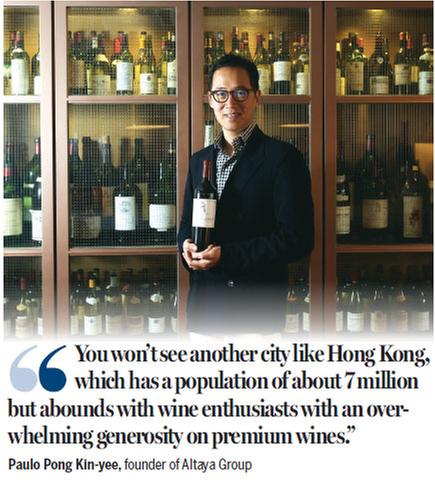Drinking it all in

Wine culture is swelling on the vine in Hong Kong, with imports and re-exports thriving and giving rise to subsidiary enterprises that cultivate local connoisseurship. Honey Tsang reports.
Starting with a welcoming champagne, Kvin Davy and his first-time clients were set to embark on a vinous adventure. They sipped and reveled in glasses of wine poured from thoughtfully chosen bottles. French sommelier-cum-wine educator Davy paired them immaculately with nibbles.
This is when the camaraderie between a wine educator and his learners tends to cement - no notes and chalkboard, just banter. Via convivial conversations, 28-year-old Davy imparts a great deal of wine knowledge to his pupils. But they were not in an academy, rather in the living room of a client.
In recent years, a new type of door-to-door wine educating service has sprung up in Hong Kong. It offers a new way for the city's wine lovers to learn about and better enjoy wines in their own apartments.
"Most learners are shy. They're often too intimidated to ask basic questions in front of strangers," said Davy, who served as a professional wine educator in sunny Provence, France, for years before moving to Hong Kong. "While learning at home, they are all just friends. The learners are always happy to ask."
| Kvin Davy (right) expounds wine knowledge to clients at the apartment room of a patron. Photo Provided by Kvin Davy |
This relatively "softer" approach to lecturing on wine appreciation comes off particularly well with wine lovers who plan on exploring more but feel thwarted by the chichi trappings of traditional wine schooling.
To Davy's delight, his business, Sommelier at Home - a venture set up in Hong Kong in 2014 - has borne fruit. He's built a broad clientele base ranging from beginners to regular wine consumers, and even oenophiles, the rather fancy term for wine lovers.
He attributes the rise of his business to locals' zeal for quality wines matched by a growing thirst for advanced wine knowledge. As he observed, the city's wine drinkers at all levels are now more eager to burnish their drinking know-how as they strive to be smarter wine consumers.
Sip smarter
This smart-drinking attitude in the city's wine scene has been trickling across the border and seeping into the soil of the Chinese mainland.
Davy is among those who are involved in remaking the wine consumption behavior among mainland drinkers. In recent years, he's been invited by enterprises in Beijing, Shanghai and Hangzhou to give sporadic wine-tasting workshops for their staff.
"These learners aren't looking for sommelier certificates or diplomas," said Davy. "They come to me simply as wine lovers who want to understand what they like and why, so that they can buy the right affordable wines that match their own tastes and values."
With the demand for mid-range wines escalating, the mainland is forecast to supplant Britain and France to become the world's second-biggest consumer by 2020, after the United States. The mainland's wine consumption is projected to soar to $21.7 billion by 2020, up 40 percent from the $15.5 billion quaffed in 2016, according to an estimate by International Wine and Spirits Research (IWSR).
Such volume is believed to represent a real appetite for wine among mainland drinkers, notwithstanding the rising trend of bottles of wine being bought as business gifts amid the mainland government's clampdown on corruption.
Though the majority of mainland drinkers are less wine savvy than Hong Kong's, "they are more eager to learn, and they tend to learn faster", Davy points out.
Song Haiyan, associate dean of the School of Hotel and Tourism Management at the Hong Kong Polytechnic University (PolyU), who oversees a nascent program named Master of Science in International Wine Management, points out that the burgeoning thirst for quality wines in the mainland has been driven by a growing middle class, most of whom are millennials who don't penny-pinch on lifestyle goods.
Relatively speaking, these mainland millennials are fussier than Generation X. They're better adapted to global wine trends, and aren't content with mediocre wines as their parents once were, Song commented.
Clinking glasses

Apart from a fundamental course on basic wine knowledge and drinking etiquette, Davy is also offering a personalized sommelier service. His duties include bringing in superb bottles from famous appellations which can pair perfectly with the food clients prepare in their kitchens.
On many occasions, Davy has been astonished by how wine savvy the clients in Hong Kong already are. "Many wine enthusiasts in Hong Kong are accustomed to the tastes of high-priced wines," he said. "They always ask me to 'surprise' them with bottles that are underrated but taste divine."
A total of 62.9 million liters 1 of wine poured into Hong Kong in 2016, amounting to HK$12 billion - seven times more than the HK$1.62 billion-worth imported in 2007.
Most of the imported bottles hail from France. In March 2017, French wines constituted a 62.4 percent share of the city's total wine imports, worth HK$619 million. Australia took second place, earning HK$181 million - an 18 percent share of the market.
Hong Kong's wine exports have also been expanding exponentially. Ever since the HKSAR scrapped all customs duties and administrative controls for wine in February 2008 in a bid to propel Hong Kong toward becoming today's Asian wine hub, the city has pulled in sizable profits mostly through re-exporting bottles to the Chinese mainland.
The cross-border wine trade has always led the market. In March 2017, the latest figures tabulated by the Commerce and Economic Development Bureau revealed that Hong Kong pocketed around HK$355 million through re-exporting wines to the mainland. That was equivalent to 76.5 percent of the city's total wine re-export receipts for the month. Destinations like Macao (13 percent) and Vietnam (6 percent) came next.
Such close ties in wine trading across the border are a result of years-long cooperation between the Hong Kong and mainland governments.
Over the past decade, various incentives have been introduced to facilitate cross-border wine trade for industry players. These include the reduction of red tape for wine re-exports to mainland ports, and zero-tariff privilege for Hong Kong-manufactured wines into the Chinese mainland under the Closer Economic Partnership Arrangement (CEPA).
Red, white and you
Altaya Group is a boutique shop offering a vast selection of top-flight wines in town since 2001. Its founder Paulo Pong Kin-yee, who is also a seasoned wine merchant, said that the dynamics of Hong Kong's wine scene, especially the fine wine sector, have become more vibrant over the past two decades.
"You won't see another city like Hong Kong, which has a population of about 7 million but abounds with wine enthusiasts with an overwhelming generosity on premium wines," said Pong, who's dubbed Hong Kong's "King of Wines" - credited to his endeavors in leading Hong Kong's fine wine industry.
For almost a decade, Hong Kong's fine wine industry has been characterized by outstanding merchants and authenticators who have a strong network of acclaimed winemakers worldwide. They help bring in a high-value selection of genuine A-class wines from all over the world.
This particular forte is avidly valued by mainland and overseas collectors. They come to Hong Kong and look for investor-grade bottles, with Chteau Lafite from Bordeaux, and Domaine de la Romane-Conti (DRC) and other Burgundy labels always the most sought after, Pong added.
In 2014, the Sotheby's wine auction held in town broke the world record by selling out the most expensive wine lot (114 bottles of Romane-Conti), valued at HK$12,556,250 - which works out at HK$110,143 for a bottle or HK$13,768 per glass.
This trend is becoming more common, especially after a vast amount of counterfeit bottles were found to be lurking around in international auctions some years ago, eating away at the global fine-wine market. One of the most devious scams was pulled off by Rudy Kurniawan, an Indonesian wine fraud who sold fake wines at auction and defrauded buyers out of millions of dollars, who was given a 10-year prison sentence in the US in 2014.
Pong commented that importing bottles directly from winemakers is the best approach to ensure that no bogus wines will slip into the supply chain in the first place. To date, Pong's firm is an exclusive agent to around 90 internationally lauded brands from Bordeaux, Burgundy, the US and more.
Dream bigger
In wine education, Davy has always been an eager beaver, and he has a new plan. He is preparing to crack a new market - that of the 40-to-50-something homegrown folks.
Unlike with the long-standing drinking culture in France, he observed that the local crowd holds a misconception that wine is a trapping exclusively for high society. However, he is pleased to see some locals are now trying to adapt to drinking wines. It's always the middle-aged men who love to order wines in Cantonese restaurants to cheer the night up a bit, he added.
"While this drinker group already takes action to embrace wines, I really want them to have the better wines. I want to guide them to grasp the basic concept of wine pairing with Chinese dishes."
He is mapping out a new project which is going to offer rookies a case of basic wines - be it Chardonnay, Pinot Noir or Ros - complete with some notes. It will give them an exploratory experience, he said. Learners will be able to acquire the knowledge themselves at home.
Davy aspires to form a trickle-down effect, first by reaching out to the wine lovers, then nudging downward to the beginners. He's set on guiding the city's people to drink smarter.
Contact the writer at
honeytsang@chinadailyhk.com
(HK Edition 06/09/2017 page7)






























